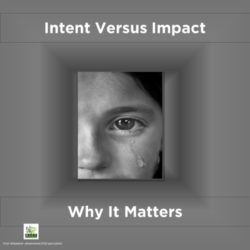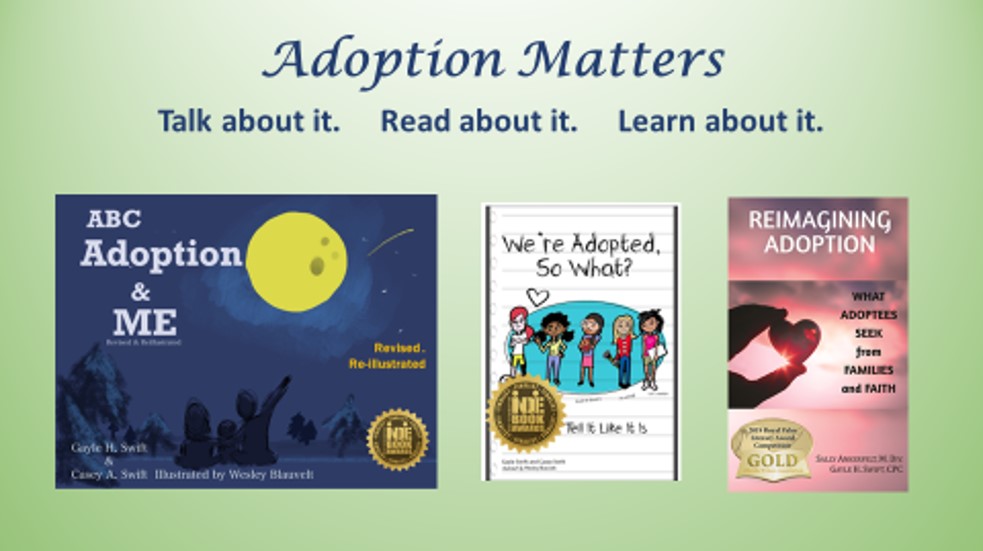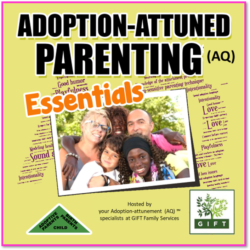Feeling short of time or finding it difficult to concentrate? You can listen to this post. Listen time 10:24
 Intent Versus Impact: Why It Matters
Intent Versus Impact: Why It Matters
It is easy–and naive–to expect that our good intent guarantees a positive result. Even the purest intentions can still yield negative consequences. Negative results–even if unintended–are no less consequential. Most folks do not deliberately behave in a way that will hurt, undermine, and discourage. Yet, some of our actions and words do just that. We are after all, human. Mistakes will inevitably be made. As Intentional Parents, we work to be the best parents we can and we strive to avoid repeating the errors our own parents made. Nonetheless. we will certainly make missteps. They will be different mistakes, errors in judgments, oversights, etc. but still they will happen.
Regardless of the goodness of our intent, the defining importance derives from the impact of our words and actions.
When the result contradicts our intentions, we must effect repairs and take responsibility as quickly as possible. By being accountable for our errors, we provide a model for our children to follow. More importantly, we demonstrate through our actions that we value the relationship MORE than we value being right. We show them that even if words or actions were not intended to be hurtful, we can acknowledge that others did experience them as hurtful. We must not expect our lack of malice to excuse any damage caused by our actions, inactions, words, or our silence.
Our apology must be heartfelt, sincere, and genuine. (The real measure of our sincerity is a commitment to not repeat the mistake. Our subsequent actions will reveal the veracity of our remorse and the genuineness of our promise to change.) When we nurture relationship, vulnerability, and have the courage to share difficult conversations, we deepen the relationship. Breakdowns will happen and the repair/accountability process is integral to healing, respect, and to the health of relationships. (Revisit our blog on apologies.)
As adoptive parents, we have additional complexities and obstacles to overcome and often we face them without the reassurance of a familiar parenting template from our own experience. Our intuition and inclinations must be informed by education. Instead, we depend on our dogged dedication to becoming High AQ parents who understand, embrace, and practice Adoption Attunement (AQ).
We understand that adoption is not a single event and realize that it is a lifetime journey for us as parents and especially for our children. They are the ones who do the heavy lifting emotionally as they strive to braid their dual identities into a healthy, cohesive, identity. Last month we referred to the Seven Core Issues of Adoption (Loss, Rejection, Guilt and Shame, Identity, Intimacy, Mastery and Self-control, and Grief.) These issues are not minor. Working through them is a hero’s journey and our children must be able to rely on us for comfort, validation, and truth.
The distinction between intent versus impact is especially powerful when we allow ourselves to see adoption through rose-colored glasses this places a hyper-focus on the benefits and minimizes the complexity. Adoption is not totally benign. While adoption was the answer to our prayers for family, it exacts a high cost from adoptees. The trajectory of their lives is permanently changed. They are severed from their family tree and lose their place in the flow of their ancestral lineage. Even in open adoptions, the original relationships are realigned, subordinated, and reshaped. There is an “intactness” that can never be reestablished. Not through openness. Not through reunion. That primal link is cut. A new connection results–whether tenuous or robust, it will never be the same as the original bond.
The current headlines bring to the forefront issues of race. Families who have adopted transracially or transculturally are particularly concerned. And all adoptive families have a special stake in the outcome. We know the pain and stigma of people devaluing our families. The pain of being seen as inferior simply because of the color of one’s skin is far more destructive and crushingly personal. For a long time, the dominant belief regarding race in adoption circles has espoused “color blindness.” Buried in the phrase is the precise reason why it is not the best solution to achieve family harmony and to support our children who do not share the same race as our own. Blindness indicates that we are not seeing something. To deny a factor as integral to our children’s identity and to the way they experience the world is not only folly, it denies them the validation and support they need so they can learn to cope and survive, and thrive.
All adoptive families have a vested interest in seeing their children as they genuinely are. We must be mindful of the chasm that exists between any fantasy child we imagined while we dreamed of becoming parents and the living, breathing human being that joined our family. we must see, affirm, and nurture their true selves as the fruit of their DNA as encouraged by our loving nurture. Their differences enhance and invigorate our families. Enjoy any similarities and commonalities while ensuring that we are equally appreciative of their uniqueness.
A new awareness of racial inequity in this country has dawned. As Intentional Parents, we must commit to having Difficult Conversations about race, of living a commitment to equity and respect. of “seeing” all aspects of our children including their race. We must teach our kids to be “I-standers” instead of “bystanders.” The best way we can do that I by living it ourselves, within our families, friendships, workplaces, and communities.
This blog has frequently quoted the words of David Augsberger: “Being heard is so close to being loved that for the average person, they are indistinguishable.” This is a powerful statement! Pause and ruminate on it. Take it to heart; it will inform your relationships in a deep way. We must ensure that our children feel seen and heard if we wish to build loving, attached, and healthy families. Wishful thinking and Good Intentions will not accomplish it. Genuinely hearing and seeing our kids in this deeply profound way is the bridge that transports us from Intention to Impact and ensures our Intention becomes a result that occurs in reality not just in our minds.
Episode 1: If Only We Knew Then What We Know Now–Adoption Attunement and Transracial AdoptionEpisode 2: As Adoptive Parents and Adoption Coaches: What parents can do to help their children be part of the solution to racial inequities and nurture tolerance?Episode 3: Special guest Lola Adebara, Founder and CEO of Minneapolis based Partnerships for Permanence shares some insights into adoption/fostering/ and racial justice.Episode 4: Sharon Obazee adoption coach, and adoptee, will discuss transracial adoption and how we can make a difference in our actions, words, families & communities with a lens particulalrly focused on the intersection of race and adoption.

Your Adoption Attunement (AQ) specialists
providing coaching and support before, during, and after adoption.”
Read these books written by our coaches.

Listen to our podcasts.



